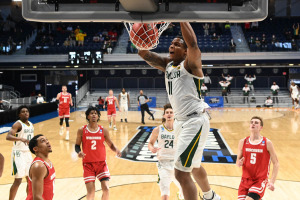
What To Watch: Baylor-Villanova, Bueckers-Clark at NCAAs
Villanova is seeking its third men’s national title in the last six years after winning it all in 2016 and 2018.

Villanova is seeking its third men’s national title in the last six years after winning it all in 2016 and 2018.
Early on, the hotels and convention center bustled with several hundred players. Now only 16 teams remain on the giant bracket that hangs from the J.W. Marriott next to the convention center, and every program wants to extend its stay.
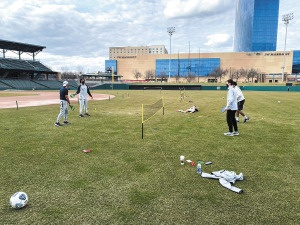
March Madness is taking on a whole new meaning for athletes, coaches and support staff, who are largely cooped up for the duration of the tournament, which ends with the championship game April 5.

Swish organizers are trying to bring back a sense of normalcy and financial security for local artists by guaranteeing they’ll be paid for their involvement in the downtown festival—even if the weather thwarts their plans.
The difference in a top-50 basketball player headed to Duke University or Kentucky and an unranked kid heading to Loyola Chicago might have felt like night and day 15 years ago. Now, the difference is negligible — if it exists at all.

Under sharp criticism during its marquee March Madness tournaments, the Indianapolis-based NCAA said Thursday it is hiring a law firm to review potential gender equity issues related to how it conducts its men’s and women’s championship events.

Interest in tickets to Sweet 16 and Elite Eight games in Indianapolis is generally outpacing the demand for tickets to earlier rounds. Tickets for Hinkle Fieldhouse games are seeing the strongest demand.
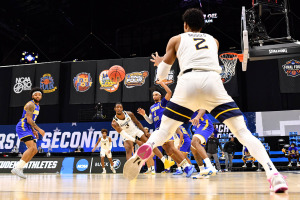
The figures, obtained by IBJ on Wednesday, show an average attendance of 2,180 people per game across the seven basketball courts at six venues. All venues limited crowd sizes because of the pandemic.

Amid mounting pressure from players, coaches and administrators over differences between this month’s men’s and women’s basketball tournaments, NCAA President Mark Emmert on Tuesday wrote that he would be calling for “an independent review.”
The National Council on Problem Gambling on Tuesday issued a set of recommendations for such deals that aim to reduce the danger of students developing a gambling problem.
The seed numbers of the 16 remaining teams add up to 94, the highest total since the NCAA Men’s Basketball Tournament expanded in 1985. Here’s how that stacks up against some previous years.

The move will allow fans and other visitors to use the Hyatt Regency, Westin and JW Marriott hotels for the first time in 10 days, after the three properties were fully booked by the NCAA for tournament needs.
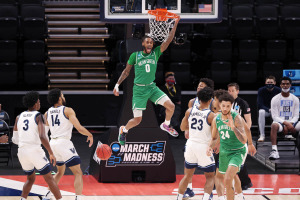
Here’s a selection of photos from second round games on Sunday at Hinkle Fieldhouse, Indiana Farmers Coliseum, Bankers Life Fieldhouse and Lucas Oil Stadium.
The NCAA has run 8,015 tests through Sunday with only one confirmed positive at the women’s tournament using daily antigen testing. The men are using daily PCR tests, considered more accurate.

The huge upset handed the Big Ten Conference its fourth loss in the tournament on the way to six by the end of Sunday. The game at Bankers Life Fieldhouse was among the first in a tournament that has seen a host of upsets in the first round.
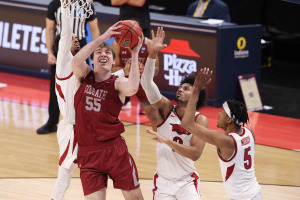
Here’s a selection of photos from first round games at Mackey Arena at Purdue, Simon Skjodt Assembly Hall at Indiana University, Hinkle Fieldhouse at Butler, Indiana Farmers Coliseum at the Indiana State Fairgrounds, Bankers Life Fieldhouse and Lucas Oil Stadium.
The NCAA announced the cancellation—officially declaring a “no contest”—about three hours before Virginia Commonwealth University was scheduled to tip off against Oregon in the West Region.
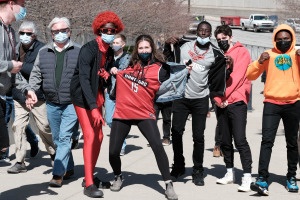
Capacity was limited to no more than 25% and bands and cheerleaders were noticeably absent. Still, most of the elements that make the NCAA Tournament America’s most beloved sporting event were on display Friday in the games played around central Indiana.

Purdue was the third Big Ten team out of the nation-leading nine it placed in the tournament to exit before the weekend.
NCAA Senior Vice President of Basketball Dan Gavitt vowed to do better during a zoom call Friday morning, a day after photos showed the difference between the weight rooms at the two tournaments.